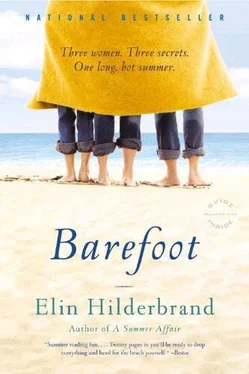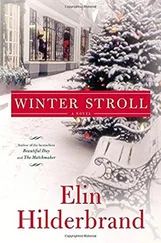Elin Hilderbrand - Barefoot - A Novel
Здесь есть возможность читать онлайн «Elin Hilderbrand - Barefoot - A Novel» весь текст электронной книги совершенно бесплатно (целиком полную версию без сокращений). В некоторых случаях можно слушать аудио, скачать через торрент в формате fb2 и присутствует краткое содержание. Жанр: Старинная литература, на английском языке. Описание произведения, (предисловие) а так же отзывы посетителей доступны на портале библиотеки ЛибКат.
- Название:Barefoot: A Novel
- Автор:
- Жанр:
- Год:неизвестен
- ISBN:нет данных
- Рейтинг книги:4 / 5. Голосов: 1
-
Избранное:Добавить в избранное
- Отзывы:
-
Ваша оценка:
- 80
- 1
- 2
- 3
- 4
- 5
Barefoot: A Novel: краткое содержание, описание и аннотация
Предлагаем к чтению аннотацию, описание, краткое содержание или предисловие (зависит от того, что написал сам автор книги «Barefoot: A Novel»). Если вы не нашли необходимую информацию о книге — напишите в комментариях, мы постараемся отыскать её.
Barefoot: A Novel — читать онлайн бесплатно полную книгу (весь текст) целиком
Ниже представлен текст книги, разбитый по страницам. Система сохранения места последней прочитанной страницы, позволяет с удобством читать онлайн бесплатно книгу «Barefoot: A Novel», без необходимости каждый раз заново искать на чём Вы остановились. Поставьте закладку, и сможете в любой момент перейти на страницу, на которой закончили чтение.
Интервал:
Закладка:
“There’s a soda machine at the end of the hal ,” Didi said.
Brenda stared at her. Soda machine? She had two tiny children here. Did the girl think her problems could be solved with a can of Coke?
“We’re not al owed to have soda,” Blaine said.
Didi stared. “Maybe you could use a walk.”
The girl wanted to get rid of them. And could Brenda blame her, real y?
“We could use a walk,” Brenda said. “Let’s go.”
She carried Porter, who was whimpering, down the polished corridor. Cottage Hospital, she thought. The kind of place where they fixed up Jack and Jil after they fel down the hil . Nothing bad happened here. Vicki was somewhere in the cottage hospital having her port instal ed. For chemotherapy. For cancer.
It should be me, Brenda thought. I don’t have kids. I don’t have anybody.
Before she got the teaching job, Brenda had never seen Champion University, except in photos on the Internet. She had taken a virtual tour like a prospective student and checked out the neo-classical buildings, the geometric lawns, the plaza where students sunbathed and played Frisbee. It looked, while not bucolic, at least sufficiently oasis-like, a real col ege campus in the melee of Manhattan. But at the start of second semester, in January, the blocks of Champion University were gray and businesslike. This only served to make the English Department, with its Persian rugs and grandfather clocks, its first-edition Henry James in a glass museum case, seem more inviting. Mrs. Pencaldron, the department’s supremely capable and officious administrative assistant, had rushed to make Brenda a cappuccino, something she did for professors currently in her favor.
Welcome back, Dr. Lyndon. How was your break? Here is your class list and the syllabus. I had them copied for you.
Brenda reviewed the syl abus. They would start by reading Fleming Trainor, and then they would compare and contrast The Innocent Impostor with the works of contemporary authors: Lorrie Moore, Richard Russo, Anne Lamott, Rick Moody, Adam Haslett, Antonya Nelson, Andre Dubus.
The reading list was so delicious, Brenda wanted to eat it with a knife and fork. There’s a wait list for your class, Mrs. Pencaldron said. Thirty-three people long. In the fall, Dr. Atela wants to add another section. Does she? Brenda had said. The department chair, Suzanne Atela, was only five feet tal , but she was exotic and formidable. She was a native of the Bahamas and had cocoa-butter skin without a single line of age, although Brenda knew her to be sixty-two years old, the mother of four, the grandmother of fourteen. She had published copiously on the literature of the Beat generation, and there were rumors she had slept with one of the minor players, a cousin of Ginsburg’s, which seemed fantastical to Brenda, but who knew what the woman was like when she took off her harlequin glasses and unpinned her hair? Her husband was a handsome Indian man; Brenda had never met him, though she’d seen a photograph of him wearing a tuxedo, on Suzanne Atela’s desk. Suzanne Atela was formidable only because she held Brenda’s future, and that of every other untenured professor in the department, in her tiny, delicate hands.
Brenda surveyed her class list. Upon initial inspection, it looked as though she had struck gold. It looked like she had gotten a class of only women . This was too good to be true! Brenda started amending the reading list in her mind—with a class of only women, they could attack Fleming Trainor and the problem of identity with a gender slant. Just as Brenda started scribbling down the titles of some real y incendiary feminist texts, her eyes hit on the last name on the list: Walsh, John . Sophomore.
Mrs. Pencaldron had tapped on Brenda’s office door. “There’s been a change, Dr. Lyndon,” she said. “You’l be teaching your seminar in the Barrington Room.”
Brenda grinned stupidly even as she crumpled her list of incendiary feminist texts and threw it away. First the cappuccino, then a mention of teaching two sections next year, and now the Barrington Room, which was the crown jewel of the department. It was used for special occasions—
department meetings, faculty luncheons—and Suzanne Atela taught her graduate students in that room. It had a long, polished Queen Anne table and an original Jackson Pol ock hanging on the wal .
“The Barrington Room?” Brenda had said.
“Yes,” Mrs. Pencaldron said. “Fol ow me.”
They made their way down the hushed hal way to the end, where the door, dark and paneled, loomed with importance.
“Now,” Mrs. Pencaldron said, “I’m required to go over the rules. No drinks on the table—no cans, no bottles, no coffee cups. The room must be opened and locked by you and you must never leave the students in the room alone with the painting. Capiche? ”
“ Capiche, ” Brenda said.
Mrs. Pencaldron gave Brenda a long, unwavering look. “I mean it. That painting was bequeathed to the department by Whitmore Barrington and it is worth a lot of money. So, for that matter, is the table.”
“Gotcha,” Brenda said. “No drinks.”
“None whatsoever,” Mrs. Pencaldron said. “Now, let me give you the security code.”
After Brenda had practiced locking and unlocking the door and setting and disarming the alarm with a long, complicated security code, Mrs.
Pencaldron left Brenda to her own devices.
“I hope you realize, Dr. Lyndon, what a privilege it is to teach in that room,” she said as she walked away.
Brenda pitched her cappuccino cup into the trash, then organized her papers at the head of the Queen Anne table and took a second to consider the painting. El en Lyndon was a great appreciator of art, and she had passed this appreciation on to her daughters with museum trips that started as soon as Vicki and Brenda were out of diapers. But real y, Brenda thought. Real y, really —wasn’t the Pol ock just a mess of splattered paint?
Who was the person who designated Pol ock as a great artist? Did some people see beyond the splatter to a universal truth, or was it al just nonsense, as Brenda suspected? Literature, at least, had real meaning; it made sense. A painting should make sense, too, Brenda thought, and if it didn’t make sense, then it should be pretty. The Pol ock failed on both fronts, but there it hung, and Brenda, despite herself, felt impressed.
It was at that moment, of Brenda feeling impressed but not knowing why, that a man walked into the room. A very handsome man with olive skin and dark eyes, close-cropped black hair. He was Brenda’s age and as tal and strapping as a ranch hand, though he was dressed like John Keats, in a soft Burgundy sweater with a gray wool scarf wrapped around his neck. There was a pencil tucked behind his ear. Brenda thought he must be a graduate student, one of Suzanne Atela’s doctoral candidates, perhaps, who had wandered in accidental y.
“Hi?” she said.
He nodded. “How you going?” He had some sort of broad antipodean accent.
“This is the seminar on Fleming Trainor,” she said. “Are you . . . ?”
“John Walsh,” he said.
John Walsh. This was John Walsh. Brenda felt her good sense unraveling in her brain like a bal of yarn. She had not prepared herself for this—a man in her class, not a boy. He was beautiful, more beautiful than the girl-women who came streaming into the Barrington Room after him like rats fol owing the Pied Piper.
Brenda wiggled her feet in her Prada loafers and stared down at her scrumptious syl abus. Day one, minute one: She was attracted to her sole male student.
Once everyone was settled, she cleared her throat and checked for cups and cans, bottles of water. Nothing. Mrs. Pencaldron must have screened everyone at the door. “I’m Dr. Brenda Lyndon,” she said. “Please cal me whatever makes you most comfortable, Dr. Lyndon or Brenda.
Читать дальшеИнтервал:
Закладка:
Похожие книги на «Barefoot: A Novel»
Представляем Вашему вниманию похожие книги на «Barefoot: A Novel» списком для выбора. Мы отобрали схожую по названию и смыслу литературу в надежде предоставить читателям больше вариантов отыскать новые, интересные, ещё непрочитанные произведения.
Обсуждение, отзывы о книге «Barefoot: A Novel» и просто собственные мнения читателей. Оставьте ваши комментарии, напишите, что Вы думаете о произведении, его смысле или главных героях. Укажите что конкретно понравилось, а что нет, и почему Вы так считаете.












